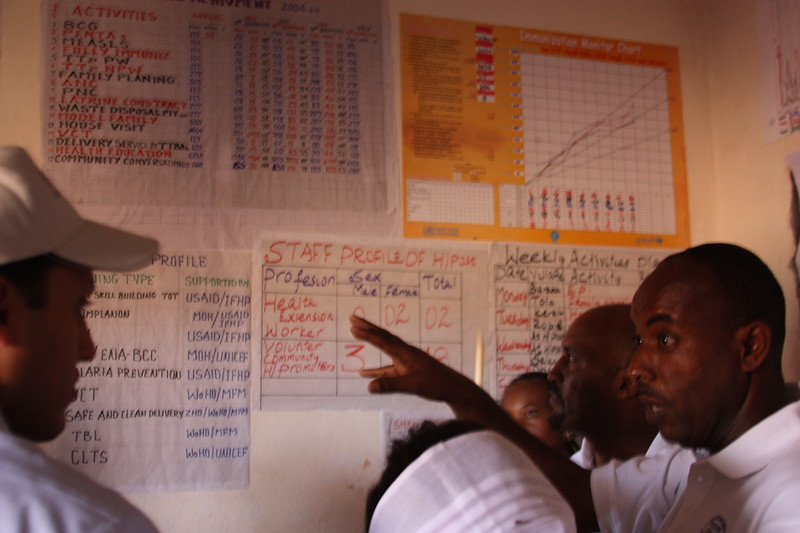Recommended

Blog Post

Blog Post
The Africa Centres for Disease Control and Prevention (Africa CDC) was founded in 2017 to address the continent’s public health challenges and strengthen the capacity of member states' own public health institutions to prevent and respond to public health threats. Central to achieving this mission is the implementation of a decentralised operational model, comprising five regional hubs, known as Regional Coordinating Centres (RCCs). RCCs serve as the dynamic bridges between the Africa CDC's overarching mission and the diverse public health landscape of individual African countries.
RCCs are strategically included in Africa CDC’s Statute, where their purpose is described as bringing into reality an "Africa CDC without walls.” Yet despite this endorsement, the establishment of RCCs has been delayed and Africa CDC has had to build the ship while sailing it. Since its creation six years ago, Africa CDC has primarily focused on establishing the secretariat and supporting member states to respond to multiple outbreaks, including Ebola, COVID-19, and mpox. Consequently, the roll-out of the five RCCs has not been uniform: while the Eastern Africa RCC, located in Nairobi, has successfully allocated land and funding towards the construction of the hub with support from the government of Kenya, the RCC for Northern Africa has not yet been established.
This blog identifies four reasons why the full operationalisation of RCCs is critical for Africa CDC to fulfil its mandate and calls for African governments and donors to support this endevour.
1. Sub-regional outbreaks and public health emergencies would be better addressed
Outbreaks such as Ebola and Lassa fever have a tendency to resurface in particular regions of the continent. Strong RCCs enable for these geographically-specific or limited outbreaks to be addressed at sub-regional level. But for the RCCs to fulfil this vital role, several prerequisites must be met.
First, RCCs must recruit experienced staff, under the leadership of a single, designated coordinator assigned to each RCC. At the time of writing, only the Southern Africa RCC has a coordinator in place, while the recruitment process for coorindators of the four other RCCs is still ongoing.
Second, critical sub-regional initiatives such as the Regional Integrated Surveillance and Laboratory Networks (RISLNET) should be fully established and operational for a more focused response to recurrent sub-regional threats. Africa CDC designed RISLNET to coordinate and integrate public health laboratories, surveillance, and emergency response resources by pooling resources, knowledge, and best practices within sub-regional networks. Central, Western, and Southern Africa RCCs have all established their RISLNETs. In fact, in Central Africa, RISLNET has been instrumental in strengthening the laboratory networks within the region and improving quality standards. Its centres of excellence, referral networks, trained personnel, and guidance documents have laid the groundwork for the sub-region's COVID-19 response strategy. Other RCCs could draw important lessons from this experience to strengthen their early detection and outbreak response.
Third, there is a need to establish sub-regional Public Health Emergency Operation Centers (PHEOCs) under each RCC to provide a centralised and coordinated approach to managing public health emergencies in their catchment area. In 2021, only 12 African countries met 80 percent or more of the minimum requirements for operational PHEOCs and were classified as fully functional. This finding underscores the critical role of sub-regional PHEOCs in bridging the gap while gradually establishing country-specific PHEOCs. It is worth noting that in July 2022, on the sidelines of the 41st Ordinary Session of the African Union's Executive Council and the 4th Mid-Year Coordination Meeting of the African Union and the Regional Economic Communities (RECs), African Heads of State and Government issued the Lusaka call to action for the strengthening of PHEOCs in Africa.
2. Functional RCCs would align with the success of Regional Economic Communities
Historically, Regional Economic Communities (RECs) have played a key role in coordinating emergency responses and resource mobilisation within their regions, exemplified by initiatives like the Ebola Solidarity Pooled Fund initiated by ECOWAS during the 2014 Ebola pandemic, and numerous efforts during the COVID-19 crisis. The RECs were established through ratified treaties by member states within their respective sub-regions. They have evolved individually, featuring distinct roles, governance structures, organisational set-ups, and capabilities, sometimes with overlapping memberships. Currently, the African Union recognises eight RECs, each with varying levels of involvement in health-related programs. Most of the RECs have a substantial presence on the ground in health and developmental activities, some with dedicated health bodies such as the West African Health Organization (WAHO). RCCs are designed to leverage REC’s experience, expertise, and resources to ensure alignment, prevent duplication of efforts, optimise resource allocation, and amplify the impact on health outcomes. In doing so, RCCs could also help manage overlapping REC memberships and could establish a joint regular forum and joint action plans to ensure adequate alignment among countries and RECs.
3. RCCs can serve as robust knowledge management hubs
RCCs are well positioned to establish comprehensive data-sharing mechanisms, research collaborations, and knowledge dissemination platforms, ensuring that vital public health information is readily accessible to inform evidence-based decision-making. One promising effort is the Extension for Community Healthcare Outcomes (ECHO) platform launched in 2017 by Africa CDC, in collaboration with the University of New Mexico. ECHO serves as a virtual platform for the exchange of information among public health professionals across various countries in a specific sub-region. It functions as a regular virtual forum with a primary focus on outbreak preparedness and response. Since its inception, ECHO has played a vital role in swiftly disseminating information about ongoing public health events. Notable examples include sharing insights regarding preparedness and responses to significant events like the tenth Ebola outbreak in the Democratic Republic of Congo, the Listeriosis outbreak in South Africa, the seventh Ebola outbreak in Uganda, and numerous cholera outbreaks across the continent. As of now, the Eastern Africa, Southern Africa, and Central Africa regions have functioning ECHO platforms, but once RCCs are further strengthened to function as sub-regional knowledge hubs, more countries will have access to valuable resources and expertise.
4. RCCs can facilitate closer engagement with all African Union member states
RCCs are overseen by Ministerial Steering Committees, comprising ministers of health from their respective regions, creating a robust platform for effective advocacy and strategic participation. These Ministerial Steering Committees convene periodically, ensuring that ministers come together for at least one regular session annually to deliberate on health security matters specific to their regions. Compare this with Africa CDC's Governing Board, where there are only ten ministers of health (two representatives from each sub-region). Therefore, through RCCs, these Ministerial Steering Committees can be strategically leveraged to mobilise and engage all African Union member states’ ministers of health in pursuit of a shared vision and facilitate closer alignment.
We need African governments and donors to support the full operationalisation of RCCs
Strengthening RCCs requires investing in resources, infrastructure, and expertise to enable the hubs to respond swiftly and effectively to public health emergencies, all while building the core public health functions in their respective regions. Critical to achieving this endeavour is high-level support and funding from African governments and donors to help advance regional health security. A good starting point is to conduct a comprehensive assessment in each region, as mandated by Africa CDC's Statute, to evaluate the status of RCC establishment and identify disparities or gaps in the process so that corrective measures can be implemented. Countries should follow Kenya's proactive approach in supporting the Eastern Africa RCC and build and strengthen these hubs in their respective regions. By pooling resources and efforts, African countries can collectively enhance their ability to respond to health crises—demonstrating a shared responsibility for the well-being of the continent's population.
Disclaimer
CGD blog posts reflect the views of the authors, drawing on prior research and experience in their areas of expertise. CGD is a nonpartisan, independent organization and does not take institutional positions.
Image credit for social media/web: DisobeyArt / Adobe Stock





